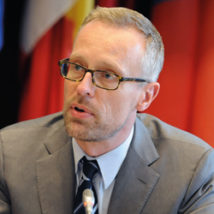Editor's message
"This issue showcases the EBRD’s work in upgrading legal regimes for business and investment in the economies where we invest."
Contributors
- Ammar Al-Saleh
- Veronica Bradautanu
- Catherine Bridge Zoller
- Alenka Cerne
- Gian Piero Cigna
- Pavle Djuric
- Jyldyz Galieva
- Vesselina Haralampieva
- Kate Harrington
- Nenad Ilic
- Rika Ishii
- Jacek Kubas
- Jelena Madir
- Paul Moffatt
- Caroline Nicholas
- Eliza Niewiadomska
- Michel Nussbaumer
- Polyxeni Pentidou
- Markus Renfert
- Yulia Shapovalova
- Taras Starosselets
- Michael Strauss
- Melis Ekmen Tabojer
- Bakai Zhunushov
- Alexei Zverev

ForewordFostering the Sustainable Development Goals
Only 10 years remain until 2030, the target date for achieving the Sustainable Development Goals (SDGs), and time is running out to accomplish the shared prosperity and sustainable world the goals envisage. Recent reports show significant progress globally, particularly in reducing poverty. Yet, many areas still call for urgent collective attention, especially those related to climate action.
The EBRD is a strong supporter of, and contributor to, the Sustainable Development Agenda. We are proud to be helping economies in central and eastern Europe, Central Asia and the southern and eastern Mediterranean transition to vibrant market economies. For the past three decades, the Bank has combined its investment programme with technical cooperation projects to bring about change for the better in these regions. The Legal Transition Programme, in particular, which this publication covers, has pride of place at the forefront of this change.
It is widely accepted that “good laws make for good economies”. Year after year, our programme has successfully put this theory into practice in the economies where we invest. More recently, however, we have expanded the scope of our work to reflect that the SDGs themselves have a strong legal dimension and that legal and institutional reforms play a crucial role in achieving them.
Indeed, SDG 16 (Peace, Justice and Strong Institutions) is directly linked to law. Its introduction underlined the development contribution of organisations such as ours that work to further the rule of law. Nevertheless, several other SDGs also call for the adoption or improvement of legal frameworks and institutions, such as SDG 5 (Gender Equality); SDG 8 (Decent Work and Economic Growth); SDG 9 (Industry, Innovation and Infrastructure); and SDG 13 (Climate Action). SDG 17 (Partnerships for the Goals) is also very relevant to our reform work, as it calls for proper buy-in from national authorities and coordination among organisations that provide aid.
This issue of the Law in Transition journal showcases the EBRD’s work in upgrading legal regimes for business and investment in the economies where we invest. In particular, the various stories highlight the strong links between our activities and the SDGs. By sharing our experience of what has worked and what has not, we hope to stimulate debate on current and future reforms. As the United Nations Secretary-General noted in The Sustainable Development Goals Report 2019, leaders everywhere now have “an opportunity to get the world back on track and to kick-start a decade of delivery for people and the planet”. In that spirit, I hope that our journal enlightens policymakers and supports all those working to create a better legal environment for business and development.
This issue of the Law in Transition journal showcases the EBRD’s work in upgrading legal regimes for business and investment in the economies where we invest. In particular, the various stories highlight the strong links between our activities and the SDGs.

Editor's message
Through its Legal Transition Programme, the EBRD promotes the rule of law as a development tool in its regions. The aim of this programme is to help establish the legal rules and institutions on which a vibrant market economy depends. The economies where we invest are at different stages of advancement in this process, as can be seen from the stories in this issue of the Law in Transition journal. Most of these economies, however, have been making progress on the path towards well-functioning legal regimes for investment and entrepreneurship, in some cases with EBRD assistance. The articles in this journal illustrate the diversity and richness of our legal reform support activities.
In the first article, Alexei Zverev and Nenad Ilic present a new standard for public-private partnership (PPP) development: the UNECE-EBRD People-First Model PPP Law. The model legislation will be of use to countries aiming to enact a solid and modern regime for PPPs.
Vesselina Haralampieva advocates the need to step up corporate environmental, social and governance disclosure as a cornerstone for delivering on the Sustainable Development Goals (SDGs). She details the various factors globally that contribute to driving big transformation towards a low-carbon and climate-resilient economy. The article includes a contribution by Kate Harrington on the relevance of food loss and waste to the green agenda.
Gian Piero Cigna, Pavle Djuric and Markus Renfert look at the benefits of corporate governance codes as “soft tools” to improve governance in companies. They detail how the “comply or explain” mechanism plays a decisive role in that context. The article draws on experiences from Croatia and Turkey.
I interviewed the new General Counsel of the EBRD, Michael Strauss, who shares his views on legal reform technical assistance by international organisations and the relevance of the SDGs to that process.
The next article is by Ammar Al-Saleh, with contributions by Jacek Kubas and Polyxeni Pentidou. It reveals the difficult balancing act of regulators when trying to address Fintech. As the author points out, too-stringent rules can stifle innovation whereas too relaxed a regime can create systemic risks. In another Fintech-related story, Jelena Madir and Melis Ekmen Tabojer discuss the concept of open banking and the risks associated with it; they consider in particular the impact of the new EU Payment Services Directive 2 and the situation related thereto in various economies in which the EBRD invests.
Eliza Niewiadomska of the EBRD and Caroline Nicholas of the UNCITRAL discuss institutional leapfrogging in transition economies, using public procurement rules and digital processes as an example. Yulia Shapovalova, Jyldyz Galieva and Bakai Zhunushov then examine a new online catalogue system introduced in the Kyrgyz Republic, expected to have a huge impact on access to public procurement markets by small and medium-sized businesses.
Veronica Bradautanu and Taras Starosselets reflect on the benefits of mediation as an alternative dispute resolution mechanism. In particular, they draw lessons from the Bank’s technical cooperation with Serbia and Moldova in promoting mediation.
Catherine Bridge Zoller and Alenka Cerne write about the Bank’s work to turn around distressed state-owned enterprises in Croatia, in light of a recently completed project. The article includes suggestions for further revitalising this complex sector of the Croatian economy.
Paul Moffatt and Rika Ishii have prepared a piece on the telecommunications sector in Uzbekistan. The article focuses on the challenges for the country to deliver on its broadband goals and suggests approaches based on proven best practices from other countries, with a focus on the positive effect of competition in this process.
I hope you will enjoy this issue of the Law in Transition journal. It aims to reflect some of the main achievements and lessons learned of our programme during the past year. We would of course welcome your feedback.
I hope you will enjoy this issue of the Law in Transition journal. It aims to reflect some of the main achievements and lessons learned of our programme during the past year. We would of course welcome your feedback.
- Alexei Zverev
- Nenad Ilic
Public-private partnerships: the UNECE-EBRD Model Law
Read article- VESSELINA HARALAMPIEVA
- Kate Harrington
Raising the Bar: how corporate environmental, social and governance disclosure is helping deliver the UN Sustainable Development Goals
Read article- Gian Piero Cigna
- Pavle Djuric
- Markus Renfert
Corporate governance codes as a tool for dialogue between issuers and investors: experience from Turkey and Croatia
Read article- Michel Nussbaumer
Interview: EBRD General Counsel Michael Strauss
Read article- Ammar Al-Saleh
- POLYXENI PENTIDOU
- JACEK KUBAS
FINTECH REGULATION:
A BALANCING ACT
Read article
- Jelena Madir
- Melis Ekmen Tabojer
Open banking creates opportunities in EBRD regions
Read article- Eliza Niewiadomska
- Caroline Nicholas
Transformational change: EBRD-UNCITRAL Public Procurement Initiative revolutionises electronic public procurement
Read article- Yulia Shapovalova
- Jyldyz Galieva
- Bakai Zhunushov
Tandoo: new opportunities for local small businesses in public procurement in the Kyrgyz Republic
Read article- Veronica Bradautanu
- Taras Starosselets
Commercial mediation: EXPERIENCE FROM Moldova and Serbia
Read article- Catherine Bridge Zoller
- ALENKA CERNE
Turning around state-owned enterprises in Croatia
Read article- PAUL MOFFATT
- RIKA ISHII



